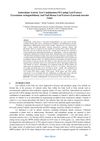April 2024 in “Journal of composites science” Hydrogel composites have great potential in regenerative medicine, tissue engineering, and drug delivery.
 10 citations,
July 2019 in “Journal of Asia-Pacific Entomology”
10 citations,
July 2019 in “Journal of Asia-Pacific Entomology” Different silkworm varieties have varying nutrient levels in their powders, which may promote hair growth.
 5 citations,
January 2012 in “Biological & Pharmaceutical Bulletin”
5 citations,
January 2012 in “Biological & Pharmaceutical Bulletin” Hura crepitans and its compound daphne factor F3 may help treat hair loss by blocking a specific hair growth inhibitor.
 9 citations,
April 2023 in “Frontiers in immunology”
9 citations,
April 2023 in “Frontiers in immunology” New technologies help us better understand how skin microbes affect skin diseases.
23 citations,
February 2021 in “Dermatologic therapy” Some treatments like pentoxifylline with topical corticosteroids might work for alopecia areata, but more research is needed to find the best one.
35 citations,
November 2021 in “Journal of nanobiotechnology” Thymol-loaded nanoparticles are a promising, natural treatment for acne that avoids antibiotics and preserves healthy skin bacteria.
 1 citations,
February 2022 in “International Journal of Health and Pharmaceutical (IJHP)”
1 citations,
February 2022 in “International Journal of Health and Pharmaceutical (IJHP)” Combining cantigi and henna leaf extracts boosts antioxidant activity.
 1 citations,
January 2015 in “Springer eBooks”
1 citations,
January 2015 in “Springer eBooks” Chemotherapy can cause skin side effects that affect patients' lives, but they can be managed to avoid interrupting cancer treatment.
 October 2017 in “The Indian Journal of Animal Sciences”
October 2017 in “The Indian Journal of Animal Sciences” The prolactin gene polymorphism doesn't affect cashmere quality in these goats.
 166 citations,
November 1990 in “Journal of Investigative Dermatology”
166 citations,
November 1990 in “Journal of Investigative Dermatology” Minoxidil sulfate stimulates hair growth.
 12 citations,
January 1991 in “Archives of dermatological research”
12 citations,
January 1991 in “Archives of dermatological research” Male hormones control a specific gene in hamster skin, with different hormones having varying effects.
 January 1990 in “Springer eBooks”
January 1990 in “Springer eBooks” Some chemicals can permanently or temporarily remove color from skin and hair, which can be distressing and is not well-regulated in cosmetics.
 26 citations,
February 2020 in “Frontiers in genetics”
26 citations,
February 2020 in “Frontiers in genetics” The CORT, FGF5, and CD36 genes are crucial for the cold weather adaptation of Yanbian cattle.
 54 citations,
November 1998 in “Archives of dermatology”
54 citations,
November 1998 in “Archives of dermatology” Avoiding certain nutrients and drugs may help manage pemphigus.
 66 citations,
September 2005 in “Photochemical & photobiological sciences”
66 citations,
September 2005 in “Photochemical & photobiological sciences” We don't fully understand how sunlight damages different types of hair.
 3 citations,
February 2020 in “The journal of gene medicine”
3 citations,
February 2020 in “The journal of gene medicine” A mutation in the HR gene causes a rare form of irreversible hair loss in two Kashmiri families. Whole exome sequencing is effective for finding such mutations.
 March 2024 in “Frontiers in genetics”
March 2024 in “Frontiers in genetics” Xiangdong black goats have moderate genetic diversity, minimal inbreeding, and important genes for reproduction, immunity, and other traits.
 2 citations,
February 2019 in “Journal of Investigative Dermatology”
2 citations,
February 2019 in “Journal of Investigative Dermatology” Higher levels of the DP2 receptor may lead to hair loss.
 March 2024 in “Research Square (Research Square)”
March 2024 in “Research Square (Research Square)” Twist2 is essential for proper skin healing and hair growth in developing mice.
 305 citations,
February 2007 in “Hormone and metabolic research”
305 citations,
February 2007 in “Hormone and metabolic research” Human skin makes sexual hormones that affect hair growth, skin health, and healing; too much can cause acne and hair loss, while treatments can manage these conditions.
96 citations,
December 2018 in “Immunity” Targeting TGFβ can improve skin immunity in older people.
 36 citations,
March 2002 in “Journal of Biological Chemistry”
36 citations,
March 2002 in “Journal of Biological Chemistry” Food deprivation increases MST enzyme in the brain, possibly affecting energy balance.
 January 2018 in “Springer eBooks”
January 2018 in “Springer eBooks” Cancer treatments targeting specific cells often cause skin, hair, and nail problems, affecting patients' lives and requiring careful management.
 31 citations,
January 2017 in “Phytotherapy Research”
31 citations,
January 2017 in “Phytotherapy Research” Ziziphus jujuba Mills may have health benefits, but more research is needed to confirm its safety and effectiveness.
 February 2023 in “International Journal of Medical Arts”
February 2023 in “International Journal of Medical Arts” Trichloroacetic acid is a safe and effective treatment for hair loss in alopecia areata patients.
 204 citations,
October 1999 in “EMBO journal”
204 citations,
October 1999 in “EMBO journal” Overexpression of activin A in mice skin causes skin thickening, fibrosis, and improved wound healing.
 125 citations,
December 2016 in “Molecules”
125 citations,
December 2016 in “Molecules” Substances from Chinese medicines show promise for immune support and disease prevention, but the way they are processed affects their effectiveness.
 39 citations,
June 2017 in “Scientific Reports”
39 citations,
June 2017 in “Scientific Reports” Different lab conditions and light treatment methods change how human skin cells respond to light therapy.
 2 citations,
October 2018 in “Springer eBooks”
2 citations,
October 2018 in “Springer eBooks” Cancer treatments can cause skin-related side effects that may affect patient quality of life and require changes in treatment.
 6 citations,
September 2014 in “Food Additives & Contaminants: Part A”
6 citations,
September 2014 in “Food Additives & Contaminants: Part A” New method effectively detects illegal hormones in anti-aging foods.

























